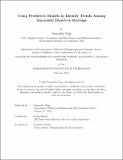Using Predictive Models to Identify Trends Among Successful Dual-Use Startups
Author(s)
Ying, Samantha
DownloadThesis PDF (1.349Mb)
Advisor
Murray, Fiona
Terms of use
Metadata
Show full item recordAbstract
This study examines predictive models for assessing the success of dual-use startups in the United States. Utilizing data from the Small Business Innovation Research (SBIR) and Small Business Technology Transfer (STTR) programs, this research focused on startups founded post-2000 to reflect contemporary technological advancements. A key objective of this study was to create a rich and comprehensive dataset, addressing gaps in the dualuse startup literature and providing a foundation for future research. Machine learning approaches, including Logistic Regression, Random Forest, and Gradient Boosting Machines, were applied to evaluate critical success factors, with XGBoost identified as the most effective model. Despite the challenges of class imbalance, the study highlights the potential of data-driven methodologies to uncover trends and inform strategies for supporting dual-use startups. By integrating predictive modeling with the construction of a robust dataset, this research contributes both to the academic understanding of dual-use innovation ecosystems and to practical frameworks for fostering their growth.
Date issued
2025-02Department
Massachusetts Institute of Technology. Department of Electrical Engineering and Computer SciencePublisher
Massachusetts Institute of Technology